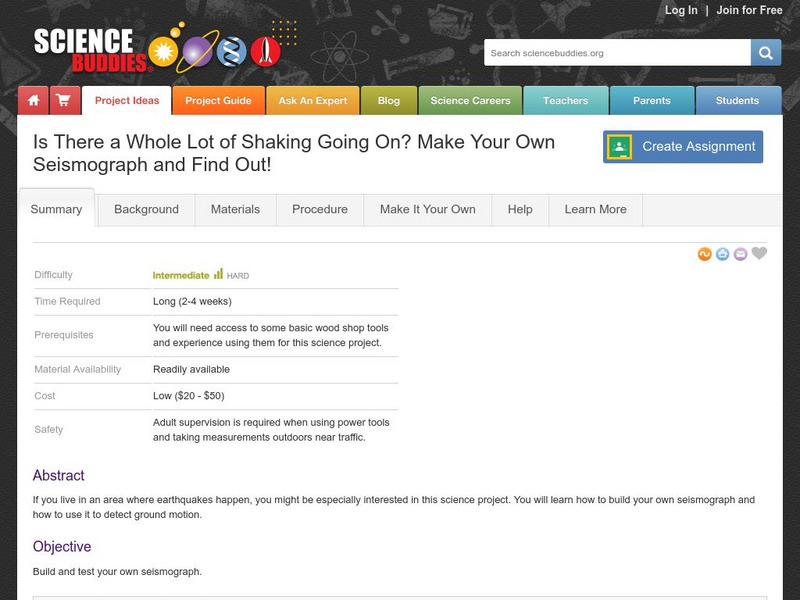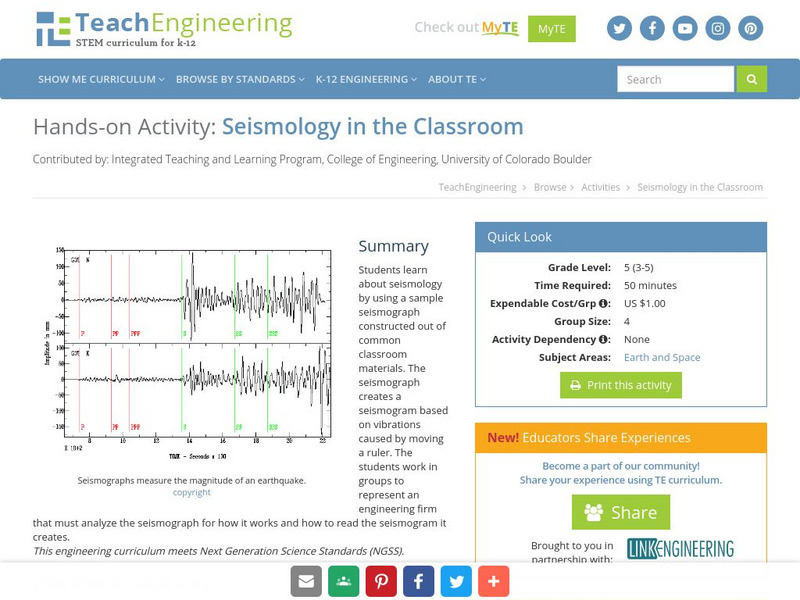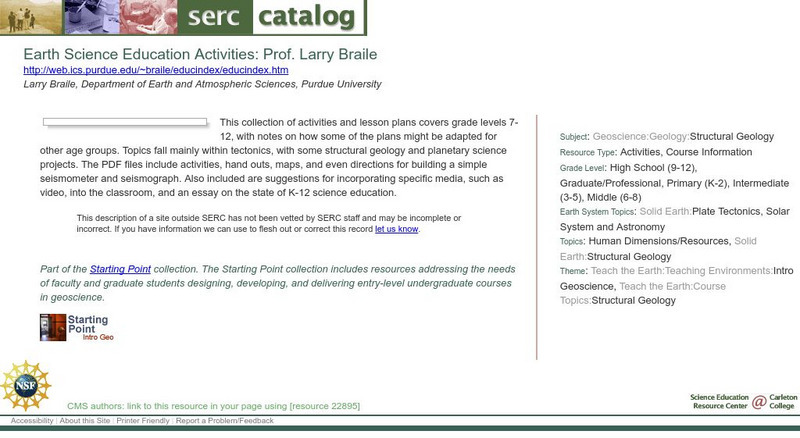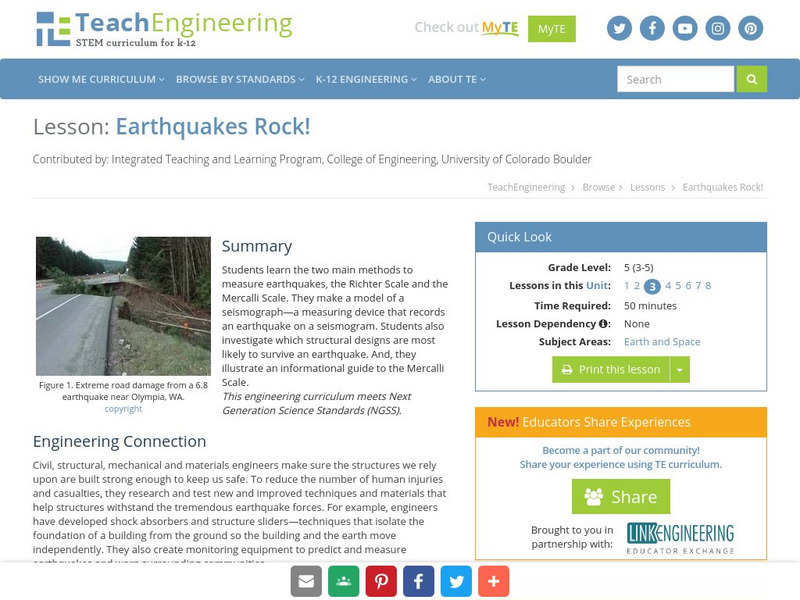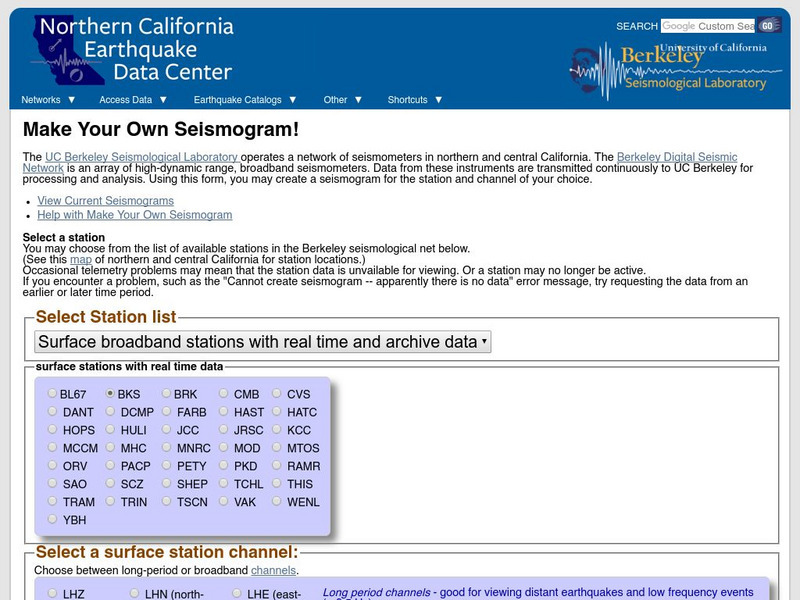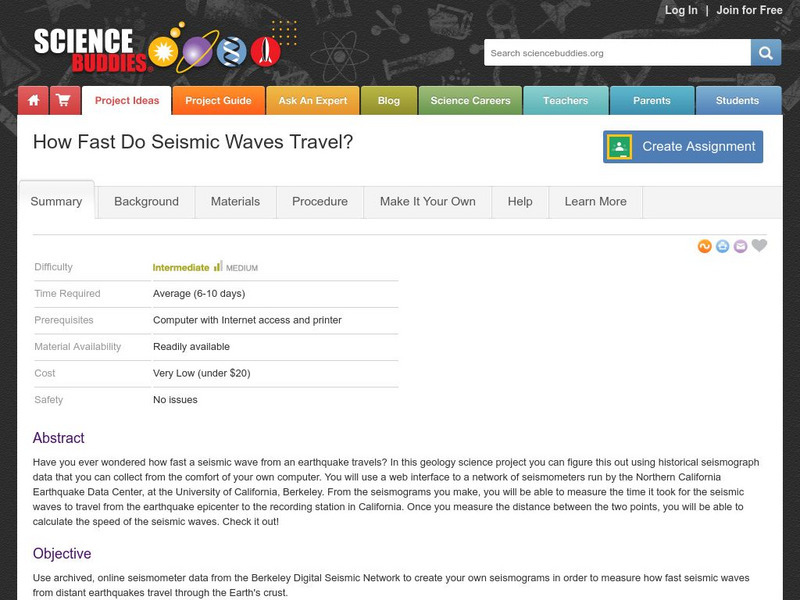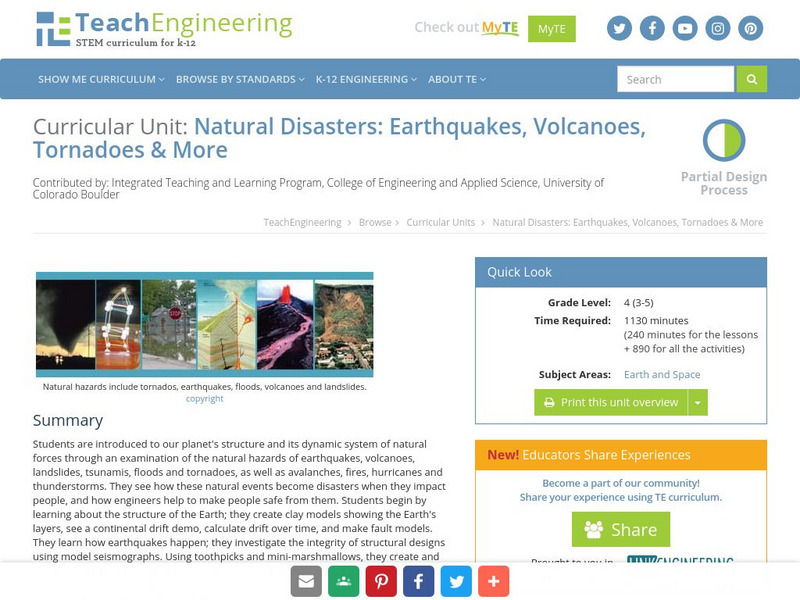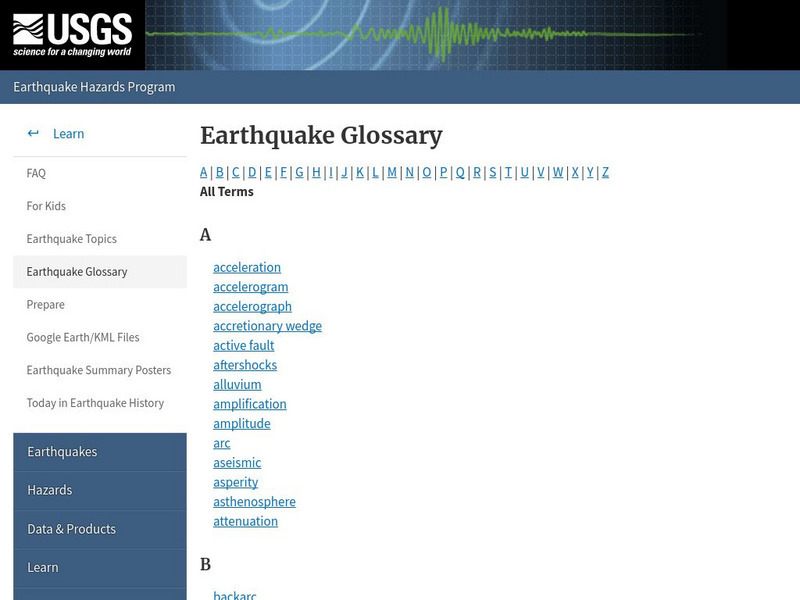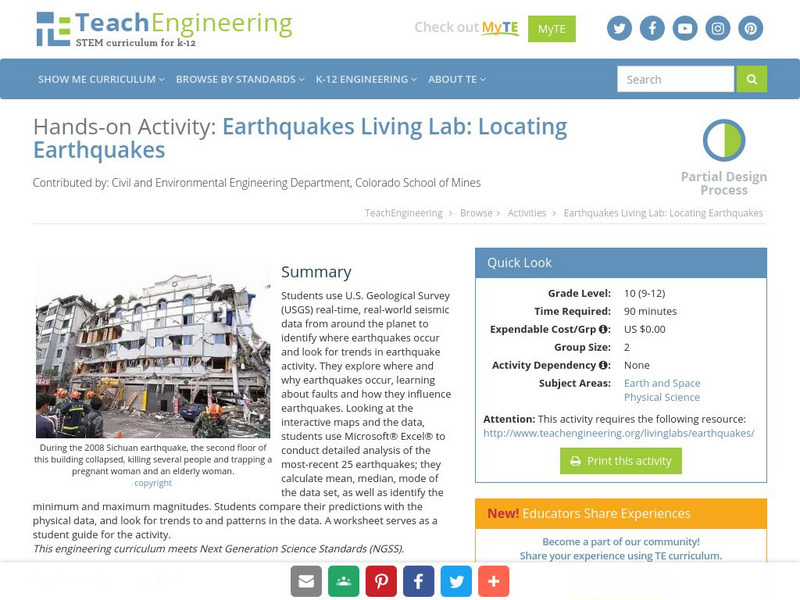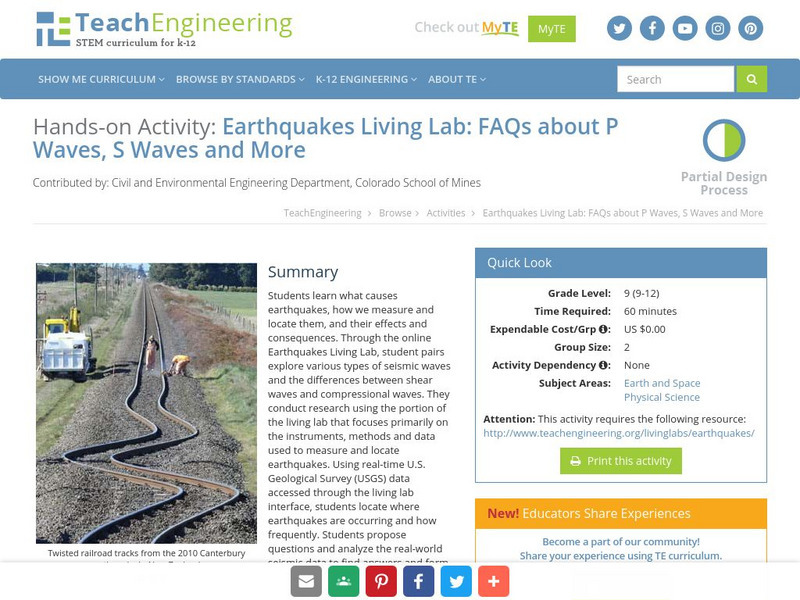Hi, what do you want to do?
Science Buddies
Science Buddies: What's All That Shaking? Make Your Own Seismograph!
If you live in an area where earthquakes happen, you might be especially interested in this science project. You'll learn how to build your own seismograph and how to use it to detect ground motion.
TryEngineering
Try Engineering: Shake It Up With Seismographs
During this lesson, students learn how seismographs work and how technology has impacted the world by helping save lives from earthquakes. They will work in teams to design, test, and evaluate the results of their own seismographs, then...
Science Buddies
Science Buddies: Make Your Own Seismograph
A seismograph is a tool scientists use to record earthquakes and measure their strength. In this activity you will build your own seismograph using simple materials.
PBS
Pbs News Hour Extra: You Don't Need a Seismograph to Study Earthquakes
Three part activity will provide students with information about earthquakes and how to predict them using various Web sites. Activities include historical background on major earthquakes, investigating mechanical waves, and simulating...
TeachEngineering
Teach Engineering: Seismology in the Classroom
Students learn about seismology by using a sample seismograph constructed out of common classroom materials. The seismograph creates a seismogram based on vibrations caused by moving a ruler. The students work in groups to represent an...
TeachEngineering
Teach Engineering: Earthquakes Living Lab: Epicenters and Magnitudes
Students learn how engineers characterize earthquakes through seismic data. Acting as engineers, they use real-world seismograph data to locate earthquake epicenters via triangulation and determine earthquake magnitudes.
Curated OER
Merriam Webster: Visual Dictionary Online: Vertical Seismograph
Labeled diagram of a vertical seismograph.
Curated OER
Merriam Webster: Visual Dictionary Online: Horizontal Seismograph
Labeled diagram of a horizontal seismograph.
Science Education Resource Center at Carleton College
Serc: Earth Science Education Activities: Prof. Larry Braile
A lesson collection covering plate tectonics, with some structural geology and planetary science projects. The PDF files include activities, hand outs, maps, and directions for building a simple seismometer and seismograph. Also included...
Other
University of South Carolina: The Rapid Earthquake Viewer
Students can get access to data from seismograph stations throughout the world to locate recent earthquakes through the Rapid Earthquake Viewer(REV).
TeachEngineering
Teach Engineering: Earthquakes Rock!
Students learn the two main methods to measure earthquakes, the Richter Scale and the Mercalli Scale. They make a model of a seismograph - a measuring device that records an earthquake on a seismogram. Students also investigate which...
Other
Ncedc: Make Your Own Seismogram
This site from NCEDC gives you an opportunity to "make your own seismogram" by choosing from a number of options on the screen.
Michigan Technological University
Up Seis: How Are Earthquakes Studied?
Seismologists study earthquakes by going out and looking at the damage cause by the earthquakes and by using seismographs. Find out who invented the first seismograph and how modern technology has changed the face of seismology when you...
Science Buddies
Science Buddies: How Fast Do Seismic Waves Travel?
Here's a geology project that uses historical seismograph data that you can collect from the comfort of your own computer. You'll use a web interface to a network of seismometers run by the Northern California Earthquake Data Center, at...
TeachEngineering
Teach Engineering: Natural Disasters
Students are introduced to our planet's structure and its dynamic system of natural forces through an examination of the natural hazards of earthquakes, volcanoes, landslides, tsunamis, floods and tornados, as well as avalanches, fires,...
US Geological Survey
U.s. Geological Survey: Earthquake Center: Glossary
This resource provides definitions of important earthquake related terms.
eSchool Today
E School Today: Your Cool Facts and Tips on Earthquakes
Explains what earthquakes are, what causes them, the different types, tsunamis that can be caused by them, and how to prepare if living in an earthquake-prone area.
University of California
University of California: Understanding Earthquakes
This website is a resource for learning about earthquakes. Java animation at this site helps you visually understand the causes of earthquakes.
US Geological Survey
Usgs: Earthquakes
The U.S. Geological Survey sponsors this site about the history of earthquakes in the United States as well as information about how earthquakes are detected and measured.
Georgia Department of Education
Ga Virtual Learning: Earthquakes and the Earth's Interior
In this interactive tutorial you will learn about earthquakes and seismic waves. Learn about why and how these form and also discuss the hazards - direct and indirect - posed by earthquakes. You will then learn how our knowledge of...
TeachEngineering
Teach Engineering: Earthquakes Living Lab: Locating Earthquakes
Students use U.S. Geological Survey real-time, real-world, seismic data from around the planet to identify where earthquakes occur and look for trends in earthquake activity.
TeachEngineering
Teach Engineering: Earthquakes Living Lab: P Waves, S Waves and More
Students learn what causes earthquakes, how we measure and locate them, and their effects and consequences.
US Geological Survey
U.s. Geological Survey: Earthquakes for Kids
A collection of articles, games, printouts, facts, science fair ideas, and links through which students learn about the history and science of earthquakes and also explore what it takes to be an "earthquake scientist."
PBS
Pbs Teachers: Seismometer
Build an instrument for measuring movement to learn about how scientists measure the Earth's movement with a seismometer.
Other popular searches
- Making a Seismograph
- Build a Seismograph
- Reading a Seismograph
- Seismograph Lab
- Read Seismograph
- Reading Seismographs
- Make a Seismograph
- Chinese Seismograph
- Ancient Chinese Seismograph
- Build Seismograph
- History of Seismographs





